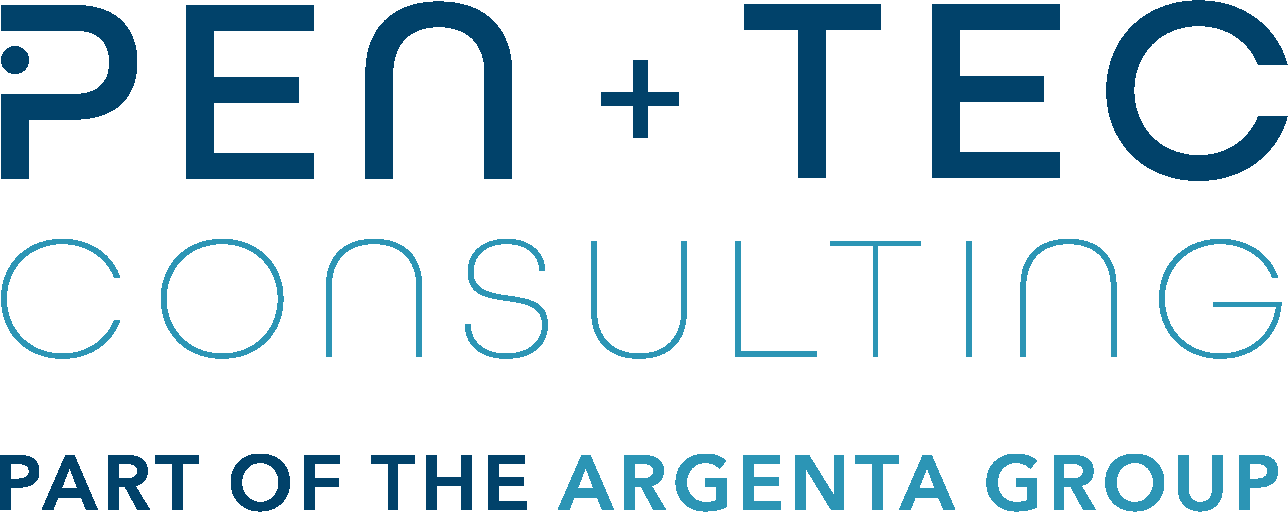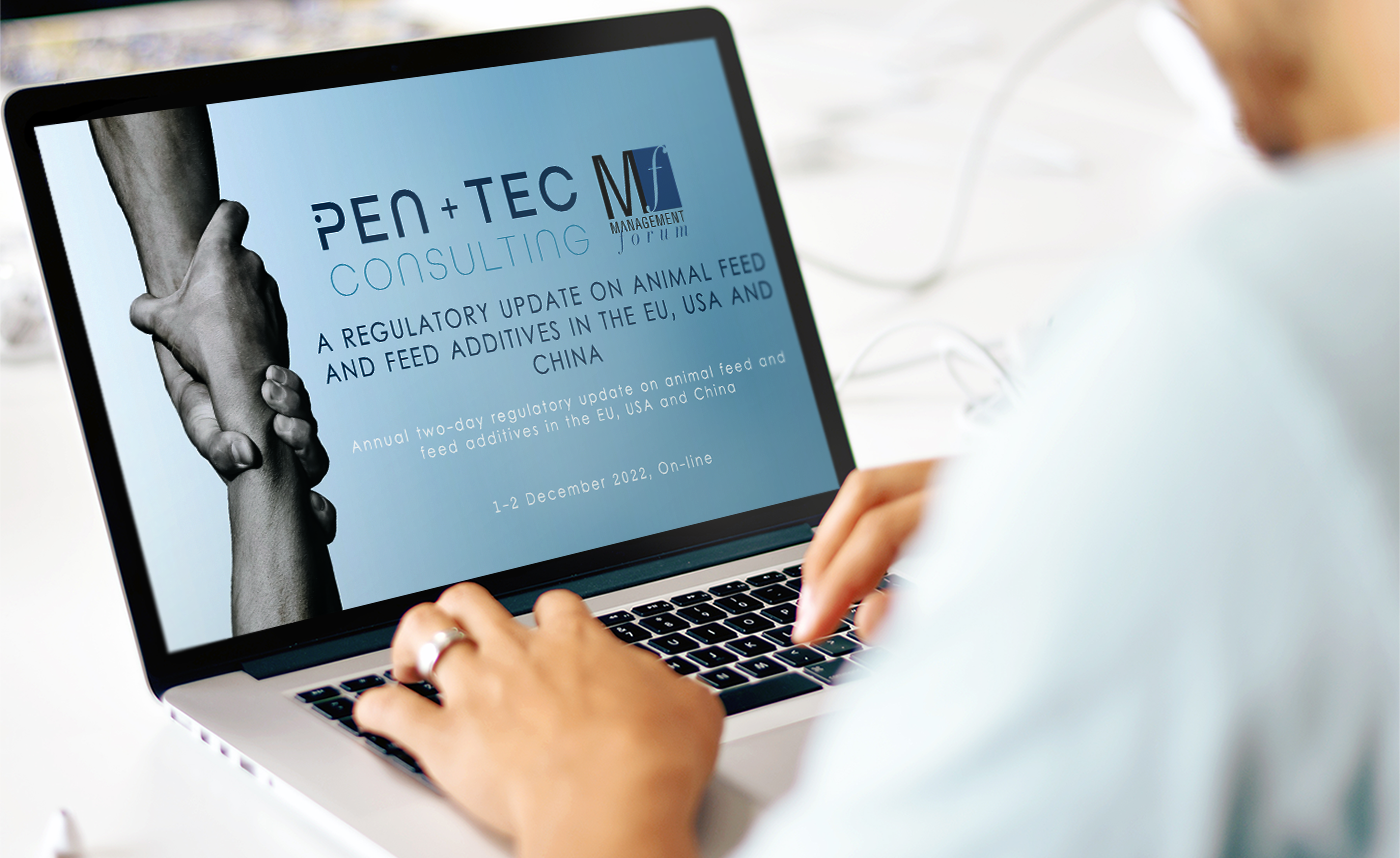–
A Regulatory Update on Animal Feed and Feed Additives in the EU, USA and China
1-2 December 2022 – annual online seminar brought to you by Pen & Tec´s regulatory experts
Pen & Tec Consulting, together with Management Forum, will deliver this practical and interactive two-day course that will review EU legislation, examine procedures and data requirements, and discuss to what extent EFSA-compliant data can be used to achieve approvals in the USA (or vice versa).
The registration is OPEN NOW.
Meeting regulatory requirements for feed and feed additives key markets in Europe and other key markets such as China and the USA are major challenges for businesses in the field of animal health and nutrition.
The EU has transformed its food legislation in the last two decades, creating EFSA (European Food Safety Authority) in 2002 and adopting a harmonised approach to food safety, ‘from farm to fork’. The 2003 Feed Additives Regulation introduced a central (‘one door-one key’) approval system for feed additives, involving the EU Commission, the EURL (European Union Reference Laboratory), EFSA and the Standing Committee on the Food Chain and Animal Health, with delegates from 28 Member States (comitology).
Regulation (EC) No 1831/2003 recategorised feed additives and extended the scope to include amino acids, silage agents and urea. New classes of feed additives were added, e.g. mycotoxin inactivators, feed hygiene condition enhancers. The EU completed its ban on antibiotic growth promoters in January 2006 and although coccidiostats remain as feed additives, maintaining approvals presents considerable challenges for FBOs (feed business operators). Re-evaluation of around 500 feed additives started in 2010 and the EU has prohibited feed additives for which no re-evaluation dossier was submitted, or which fail EFSA’s scrutiny. A new feed regulation, the feed material register and the catalogue of feed materials have all improved transparency in feed labelling, while allowing some physiological and functional claims.
Depending on intended use, the US FDA may regulate a product added to animal feed as either a drug or a feed ingredient. In either case, the Food Drug and Cosmetic Act requires the sponsor to obtain FDA approval or GRAS recognition prior to marketing. In the past, FDA has followed a policy of enforcement discretion to allow marketing of unapproved products if evaluated by the AAFCO feed ingredient definition process and listed in the AAFCO Official Publication. The FDA now encourages sponsors to use the food additive petition procedure for new products.
The Chinese Ministry of Agriculture introduced new guidance and legislation on feed additives, adopting some aspects of EU/EFSA, other aspects of USA FDA, and some uniquely Chinese approaches in the area of animal nutrition.
For these reasons many companies manufacturing or marketing feed additives wish to address, as far as possible, the regulatory requirements of EU, Chinese and US authorities in a single project. This event will provide an excellent forum to discuss with key experts the regulatory requirements and how to comply with them. Furthermore, informal workshops will enable delegates to work together to solve regulatory problems.
Programme highlights:
- Update on the UK animal feed legislation
- The changing face of EFSA – engaging stakeholders, status of new EFSA guidance
- Re-evaluation of EU feed additives – challenges remaining
- EU ten-year renewals – a smaller hurdle for approved feed additives?
- EU procedures and timelines in relation to feed additive applications
- New approaches to the risk assessment of feed additives of botanical origin
- Permitted claims and borderlines between feeds, veterinary medicines and feed additives – differences between the EU, USA and China
- US FDA approaches to the regulation of nutritional products for animals
Managers working in:
-
- Regulatory
- Business development
- Feed business operators
- Strategic marketing managers
- Registration managers
- Product managers
- R&D scientists
- Project managers
- Senior managers seeking a ‘snapshot’ of current regulatory trends and challenges in feeds and feed additives in Europe, China and the USA.
 Rocío Duchén Bocángel
Rocío Duchén Bocángel
Rocío Duchén is an analytical chemist, with experience in research and consulting. She holds a Bachelor Degree in Chemistry, a Master Degree in Forensic Chemistry, as well as a Master Degree in Translation Studies. Rocío has worked in research of natural products and food additives, and has experience in the development and validation of analytical methods. She has also collaborated as a specialist consultant in the food industry and the Government Office of Genetic Resources in her home country, Bolivia, being co-author of a compilation book on Bolivian plants with therapeutic potential. Since her incorporation to Pen & TecConsulting’s team, in 2017, she has broadened her experience as a Regulatory Affairs Manager, focusing on the registration of food and feed regulated products in the EU. Pen & Tec Consulting has recently became part of the Argenta Global group.

Dawn Botha
Dawn Botha was born and raised in South Africa and completed her Master of Science in dairy nutrition at the University of Stellenbosch near Cape Town. Later in her career, she took an interest in marketing management and decided to add this to her skill set.
She has extensive experience within the animal nutrition and animal health fields, in particular production animals and has worked for multinational animal health companies in South Africa. She joined the team from Pen & Tec Consulting as their Technical Marketing Manager and is now based in Barcelona, Spain.
 Kristi Smedley
Kristi Smedley
Kristi O. Smedley, PhD, has been consulting in the regulation of Food and Drug Administration (FDA) regulated products since 1996. Previous to this she worked at the FDA’s Center for Veterinary Medicine in the animal feed and policy areas for 10 years. She has also authored two publications that compare and contrast the global regulation of feed ingredients. In the past 10-years her consulting has been predominantly with animal feed ingredients. Kristi is an active volunteer with the American Association of Feed Control Officials as an advisor and committee member. She earned her doctorate in ruminant nutrition from Virginia Tech.

Xiaohua He
Xiaohua He is the Managing Director of knoell Shanghai in China. She studied chemistry and environmental chemistry. After holding PhD in Biogeography in the Environmental Research Centrum at the University Saabruecken in Germany, she worked in research and teaching in ecotoxicology and molecular toxicology in the University Saarbrucken and University Tier.
Xiaohua He joined knoell in 2007, where she is a subject matter senior expert in environmental chemistry and eoctoxicology, as well as in China regulatory affairs. Dr He is appointed as Managing Director of knoell Shanghai since 2017, where she is works with the local and knoell global animal health teams together carrying out consultancy services in China with aspects of regulatory support, complicance strategy, study management and monitoring, dossier preparations and submissions.
European Union
The role of the EU and Comitology
- Scope of EU feed additive legislation – EU Mandate
- Post-EFSA opinion – Comitology
- Special case of supplementary dossiers
EFSA’s risk assessment of feed additives & role of EURL
- EFSA: Administrative check & risk assessment
- EURL: Samples & validation/verification
The transparency regulation – changes to feed additive registration procedure
United Kingdom and Great Britain
- Registration of feed additives in the UK post Brexit
USA
- The US FDA approach to the regulation of feed ingredients
- Legal and regulatory framework
- Authorisation pathways for feed ingredients
- Recent changes
China
China market access and regulatory requirements for feed additives
- Regulatory management framework
- Key regulations and changes
- Market access requirements and registration procedures
Workshop 1: Micro-organisms intended for use as feed additives or production strains in the EU – requirements and practical examples
Workshop 2: Design of efficacy studies for EU registrations – what EFSA wants.
Workshop 3: Registration process of feed additives in the EU – practical examples.
To book the course please follow the link.
1-2 December 2022
On-line seminar
Early Bird Prices till the 27th October 2022
GBP 999 + VAT*
EUR 1,439 + VAT*
USA 1,630 + VAT*

